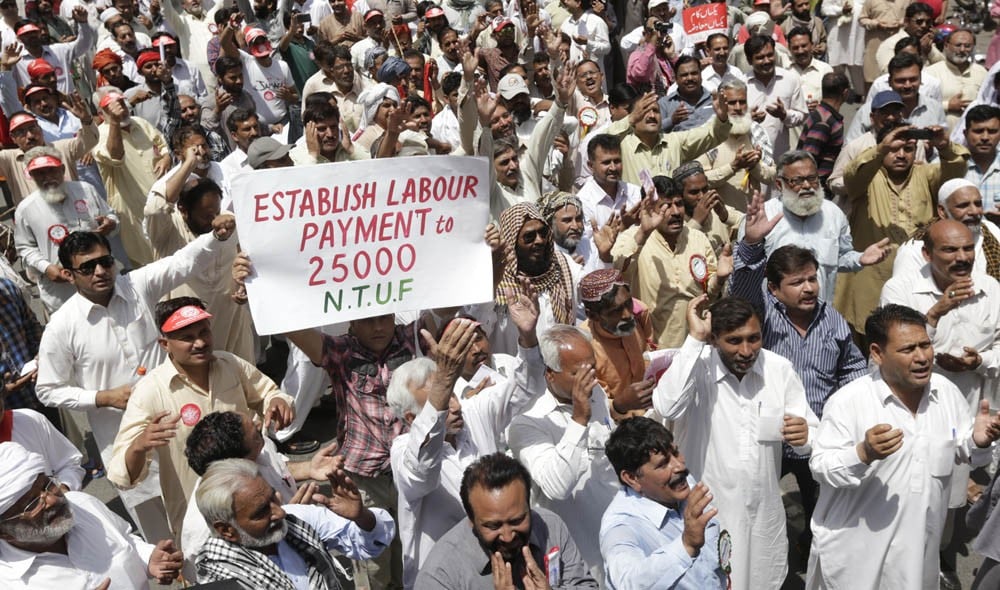
With the erosion of their constitutional right to form unions, workers have lost their collective bargaining powers

"Every citizen shall have the right to form associations or unions, subject to any reasonable restrictions imposed by law in the interest of sovereignty or integrity of Pakistan, public order or morality," states Article 17(1) of Pakistan’s 1973 Constitution under the fundamental rights section.
Pakistan is a signatory of two major Conventions of International Labour Organisation (ILO), including "Freedom of Association and Protection of the Right to Organise Convention, 1948 (No. 87)" and "Right to Organise and Collective Bargaining Convention, 1949 (No. 98)". These conventions bind the state to make laws and put in place institutions to enable workers to organise themselves as a collective bargaining force.
Despite the laws and state institutions, the number of workers in trade unions is shrinking. The Labour Force Survey 2014-15 estimates, a majority of labour force (42 per cent), associated with agriculture and fishing sector, do not have a legal right to form a trade union under the relevant industrial relations laws.
Industrial Relations Act (previously the Industrial Relations Ordinance, 1969) deals with trade unions registration and other matters. After the 18th Amendment in the Constitution, the provincial assemblies have made their IRAs which are mainly adaptation of the 1969 law.
When Pakistan came into being, there was very little industrialisation in this part of the subcontinent, but trade unions of railway, postal workers, and other sectors were quite active. By 1950-51, an estimated 25 per cent of Pakistan’s labour force was registered with trade unions. This number has shrunk to only 3 per cent, according to a report by Pakistan Workers Confederation.
Pakistan had inherited two major laws pertaining to workers’ right of association and collective bargaining -- the Trade Unions Act 1926 and Trade Dispute Act 1929. The Trade Unions Act 1926 had provided every citizen (except for uniformed employees of the Army) a right to form a union or join an existing union.
Restrictions on trade unions, especially for their collective bargaining and the right to strike in many areas started in the early years of independence when in 1952 the Essential Services (Maintenance) Act was introduced.
The martial law regime of Ayub Khan scraped both the laws of trade unions in 1959. For the next 10 years, till 1969, there was no law for the trade unions under Ayub’s martial law regime. He enacted Industrial Relations Ordinance 1969, which dealt with registration and governance of the trade unions.
"In fact, the 1969 law was an amalgamation of the previous two laws, but this new law has a long list of exceptions that means the government employees, police and military’s civilian employees and other essential service workers cannot form trade unions," says Karamat Ali, Executive Director, Pakistan Institute of Labour Education and Research. This law also did not cover the agriculture workers, in fact only 10 per cent of the total workforce can benefit from this law.
Read also: A day in a labourer’s life
Quaid-i-Azam Mohammad Ali Jinnah was the driving force in the Imperial Legislative Assembly (of India) for the passage of Trade Unions Act 1926. He was also President of the Postal Staff Union in India, "but the rulers of new country, Pakistan scraped that important law," adds Ali.
Under the rule of Zulfikar Ali Bhutto, especially after the nationalisation of industries, trade unions witnessed a boom as new trade unions emerged and their membership increased, but after the imposition of martial law in 1977 by Ziaul Haq and the start of a process of denationalisation, trade unions received a setback.
The trend of trade unionism declined with the introduction of IMF-sponsored economic policies of privatisation, deregulation and liberalisation in the early 1990s.
Trade unions lost their power of collective bargaining due to neo-liberal and globalisation policies, which resulted in large-scale privatisation of public sector institutions and introduction of contract labour system as well as third-party contract employment.
"It is a fact that trade unions always flourish in public sector organisations and Wapda union is a an example," says Abdul Lateef Nizamani, President of Pakistan Wapda Hydroelectric Workers Union. "Strong unions in PTCL, KESC and banks have almost vanished after their privatisation, adds Nizamani.
Employment system based on third-party contract snatches all legal benefits from the employees, including social security and health and safety, etc. Internally, trade union movement has also weakened because of their groupings. "Role of labour department in implementation of laws is also a main cause of declining trade unionism in Pakistan," says Nizamani.
According to a former finance minister, Dr. Hafiz A. Pasha, only one to 2 per cent industrial workers are organised under the trade unions in Pakistan. With such a poor situation and erosion of the constitutional right of association, the workers in any sector of the economy have virtually lost their collective bargaining powers.